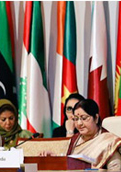BRICS in the Post-Liberal World Order: A New Agenda for Cooperation? Perspectives from South Africa
Given complexities currently underpinning multipolar realities of the international system, it seems that a pluralist internationalism is becoming a strategic consideration for a post-Western world order. This warrants new agendas for cooperation. Based on the latter this analysis examines to what extent the BRICS can articulate such a new agenda based on a South African-informed perspective. This involves exploring the basis of a BRICS-African agenda competing with the geo-political interests of sub-groupings such as the SCO, RIC, and the EAEU.
- Francis A. Kornegay , Sanusha Naidu
- November 2019









